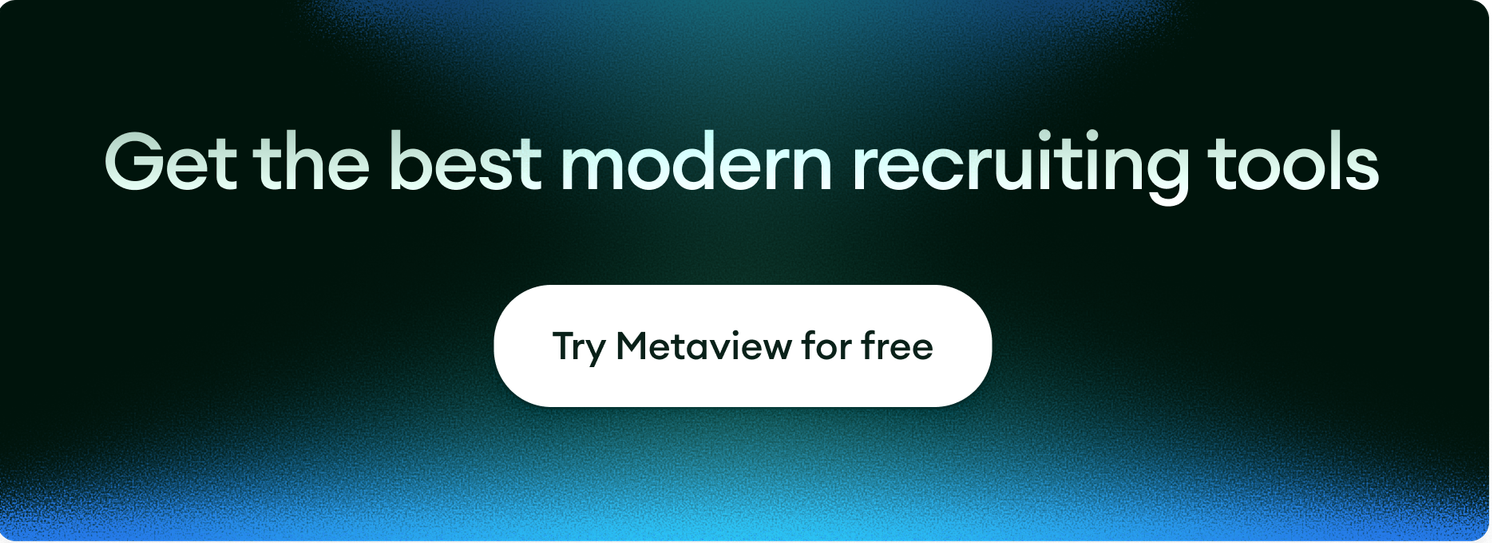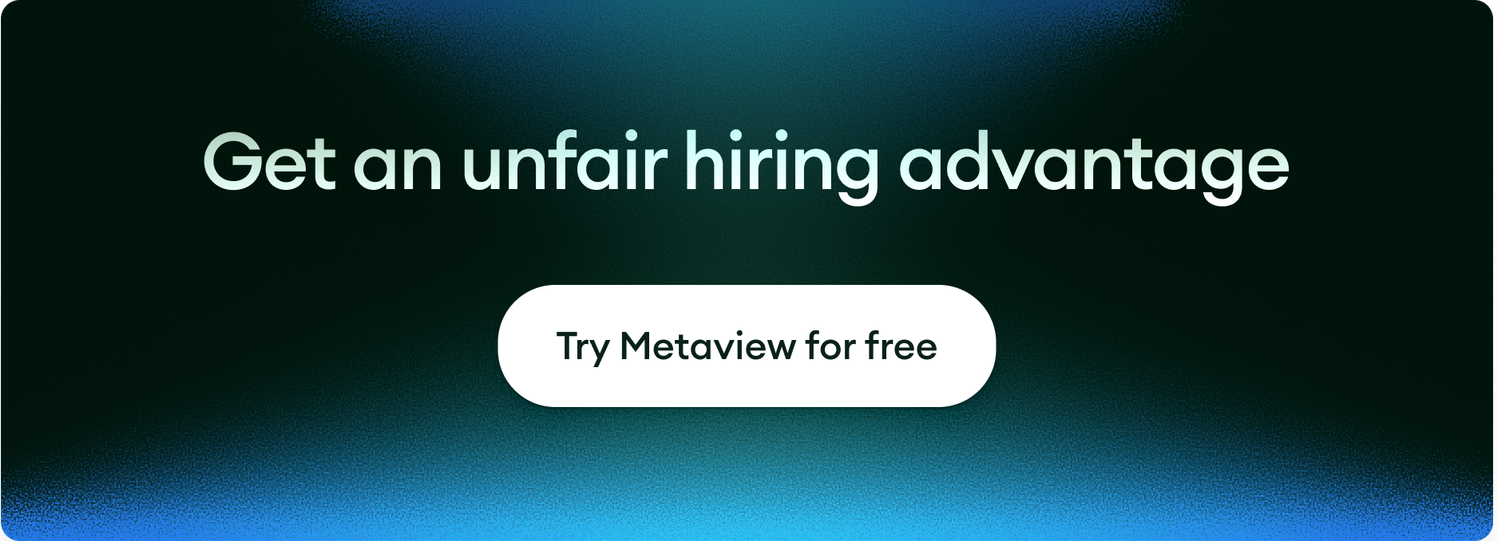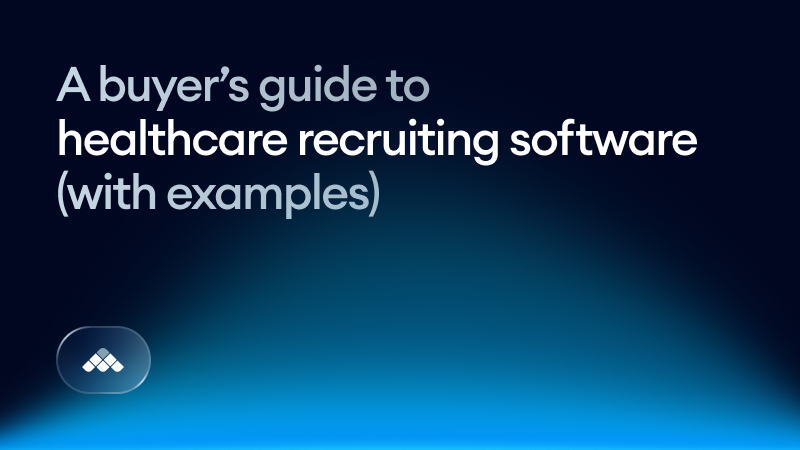Healthcare recruiting has always been one of the most complex and high-pressure areas of talent acquisition. Between skills shortages, compliance requirements, and the constant need for speed, healthcare recruiters face an uphill battle every day.
And the stakes are high. Finding a nurse, technician, or administrator isn’t just about filling a role, you’re keeping essential services running smoothly and protecting vital patient outcomes.
Recruiters in this space balance a demanding mix of technical assessments, licensing checks, and emotional intelligence. They need to find people with both professional expertise and the right bedside manner, often under tight deadlines.
That’s why the right recruiting software is so critical. Purpose-built tools help recruiters source smarter, automate repetitive tasks, and make faster, fairer decisions, all while keeping compliance and candidate experience front and center.
3 key takeaways
- Healthcare recruiting requires precision and empathy. Every hire has a direct impact on patient care, so recruiters must balance efficiency with a human-centered approach.
- AI and automation are indispensable. Intelligent tools streamline sourcing, screening, and scheduling, freeing recruiters to focus on building relationships and making confident hiring decisions.
- Visibility and efficiency are essential for central recruiters. In multi-location healthcare systems, centralized visibility into hiring pipelines and consistent workflows ensure smoother collaboration and faster time-to-hire.
What is healthcare recruiting?
Healthcare recruiting is the process of identifying, attracting, and hiring professionals across the healthcare ecosystem. This includes everyone from doctors, nurses, and clinicians to support and administrative staff.
Unlike most industries, healthcare recruiting requires strict credentials, licenses, and background checks, often across different states or regulatory frameworks.
And every position impacts patient care, safety, and satisfaction. Recruiters must move quickly, but they can’t afford to compromise on quality or compliance. They need to provide a respectful, transparent experience to candidates who are often already overextended in their current roles.
Effective healthcare recruiting combines deep industry knowledge, strong relationship-building, and the right technology. When those three pieces come together, healthcare organizations can build resilient, high-performing teams capable of delivering exceptional care.
Key challenges for healthcare talent acquisition
Recruiting in healthcare means filling vacancies in one of the most complex, competitive, and emotionally demanding industries. Talent teams face mounting pressure to move quickly while upholding the highest standards of care and compliance.
Here are some of the biggest challenges healthcare recruiters face today:
- Severe talent shortages: Many healthcare organizations compete for the same limited pool of licensed professionals. According to the American Hospital Association, staffing shortages remain one of the top threats to care quality and operational stability.
- High turnover and burnout: The demanding nature of healthcare roles creates constant churn, forcing recruiters into a reactive cycle of backfilling instead of proactively growing talent pipelines.
- Compliance and credentialing requirements: Unlike most industries, healthcare hiring must adhere to strict regulatory checks, from state licenses to background screenings and continuing education verifications. All of which slow down the hiring process.
- Operational complexity: Healthcare systems often span multiple facilities and departments, each with different needs, processes, and timelines. Without centralized visibility, recruiting becomes fragmented and inefficient.
- Intense competition for top talent: Employers must differentiate themselves through culture, flexibility, and mission-driven work. But many healthcare organizations still rely on outdated recruitment tactics that fail to capture candidates’ attention.
All of this results in longer hiring cycles, increased costs, and overworked recruiting teams struggling to meet business demands.
Why AI and automation are now critical
As healthcare systems grow in scale and complexity, traditional recruiting methods simply can’t keep up. Manual sourcing, screening, and scheduling are time consuming and error-prone. Especially when dealing with hundreds of open roles across multiple facilities.
AI and automation offer a way forward. They streamline high-volume, repetitive tasks, reduce human bias, and ensure that every candidate is assessed consistently and fairly. For healthcare recruiters, this means more time to focus on building relationships and ensuring cultural and clinical alignment.
AI-powered tools can:
- Source candidates automatically, based on qualifications, location, and certifications.
- Analyze interviews and feedback, to identify top performers faster and ensure consistency in hiring decisions.
- Automate scheduling, reminders, and follow-ups to eliminate delays and candidate drop-off.
- Provide real-time insights into where bottlenecks occur, helping talent teams continuously refine their process.
AI enhances the essential human touch in healthcare hiring. Recruiters and hiring managers can dedicate their time to what truly matters: connecting with candidates, assessing empathy and motivation, and building long-term relationships that support great care outcomes.
5 healthcare recruiting software tools to try
Choosing the right recruiting software can make or break your ability to hire efficiently in healthcare. The best solutions automate administrative tasks, centralize data, and help recruiters focus on high-value relationship building. Below are five standout tools designed to help healthcare talent teams hire faster, smarter, and with greater consistency.
1. Metaview
Metaview transforms the way organizations understand and improve their hiring conversations. It automatically records and transcribes interviews, then uses AI to analyze what’s said. You get structured insights about candidate qualifications, communication style, empathy, and alignment with your care values.
Whether you’re hiring a nurse, a physician, or a patient services representative, interviews must assess not just clinical competence but also bedside manner, compassion, and cultural fit. Metaview helps ensure interviewers evaluate these consistently across teams and facilities.
Recruiters and hiring managers can see exactly what differentiates successful hires, standardize assessments across multiple interviewers, and uncover trends that drive better hiring outcomes. All while saving hours of administrative effort.
You get faster, fairer hiring decisions, improved candidate experience, and stronger alignment with your organization’s values of empathy and patient-first care.
Key benefits
- Automatically transcribes and summarizes interviews for easy sharing and review
- AI Sourcing agents find ideal candidates and fills your pipeline based on a few notes or a short intake call
- AI-driven insights reveal patterns in hiring success and candidate alignment
- Helps reduce interviewer bias by standardizing how feedback is captured
- Integrates seamlessly with ATS tools like Greenhouse, Lever, and Workday
- Enables compliance-friendly documentation for regulated healthcare environments
Best for: Improving interview quality, consistency, and hiring insights across healthcare organizations
Pricing: Free plan available; Pro plan from $50/user/month; Custom (enterprise) pricing available on request.

2. Hireology
Hireology is an ATS purpose-built for distributed, high-turnover industries including home healthcare, senior living, and urgent care. It helps teams centralize job distribution, automate reference and background checks, and track candidates across multiple facilities or care centers.
For healthcare recruiters dealing with constant turnover or staffing shortages, Hireology offers templates, automated workflows, and pre-screening tools that drastically reduce manual effort. The platform also tracks credentials, ensuring compliance while accelerating the hiring of nurses, CNAs, and support staff.
Key benefits
- Designed for multi-location, high-volume healthcare hiring
- Streamlines background checks and credential verification
- Pre-built job templates for healthcare roles (e.g., RNs, CNAs, LPNs)
- Built-in onboarding tools for faster start dates and lower administrative overhead
Best for: Small-to-midsize healthcare organizations hiring at volume.
Pricing: Essentials and Professional packages available; pricing on request.
3. iCIMS
iCIMS is a robust talent acquisition suite designed for scale. It’s ideal for large healthcare organizations juggling hundreds of open roles across departments, facilities, and regions. The platform supports complex workflows like multi-step credential verification, EEO and HIPAA compliance tracking, and provides role-based access for different hiring stakeholders.
Its integrated CRM and onboarding modules help health systems keep candidate data centralized and compliant while maintaining a strong pipeline of nurses, clinicians, and administrative professionals.
iCIMS also offers advanced analytics so HR leaders can identify which roles or departments are struggling most with hiring and retention.
Key benefits
- Comprehensive ATS with built-in compliance and credential management tools
- Candidate relationship management (CRM) features to nurture passive healthcare talent
- Strong reporting for DEI and regulatory metrics
- Integrates with payroll, scheduling, and HRIS systems commonly used in healthcare
Best for: Large hospital networks and health systems needing end-to-end talent management.
Pricing: Available upon request.
4. SmartRecruiters
Healthcare recruiting is inherently collaborative. HR partners, department heads, and medical directors often participate in hiring decisions. SmartRecruiters shines by enabling easy communication and transparency across all stakeholders.
Recruiters can manage everything from job distribution to structured evaluations in one platform, reducing time to fill for critical care and clinical roles. With its mobile accessibility, managers can review applications, provide feedback, and approve offers even from a patient floor or remote facility.
Key benefits
- Unified, cloud-based platform for recruiters and hiring managers
- Mobile-first experience for on-the-go healthcare leaders
- Automated job posting and candidate tracking for high-volume roles
- Integrations with leading healthcare job boards and background screening vendors
Best for: Streamlining collaboration between recruiters, hiring managers, and department leads.
Pricing: Essential plan from $14,995; Custom plans available on request.
5. Workable
Workable is ideal for smaller healthcare teams or startups that need a modern, intuitive recruiting solution without enterprise complexity. It combines powerful AI sourcing, structured interview kits, and automated scheduling to help small practices hire faster and more professionally.
Because Workable integrates with hundreds of job boards including healthcare-specific platforms like Health eCareers and HospitalCareers, recruiters can expand their reach while staying organized in one system. It’s also HIPAA-compliant and offers role-based permissions to keep sensitive candidate information secure.
Key benefits
- AI-assisted sourcing and candidate ranking for healthcare roles
- Access to a wide network of general and healthcare-specific job boards
- Structured interview guides for clinical and administrative positions
- Secure, compliant data handling for patient-facing organizations
Best for: Healthcare startups and fast-growing medical practices.
Pricing: Standard plan from $299/month; Premier plan from $599/month.
Each of these tools serves a different need within healthcare recruiting, from enterprise-level compliance to interview intelligence and frontline hiring. Combined with the right process, they let healthcare talent teams move fast, reduce costs, and elevate hiring quality, so the best professionals are placed where they’re needed most.
Build your ultimate healthcare hiring engine
The right healthcare recruiting software can transform a reactive, high-stress hiring process into a streamlined, data-driven system that prioritizes both speed and quality. And critically, they help ensure the best people are in position to deliver life-changing care.
By automating repetitive tasks, centralizing candidate data, and bringing clarity to interviews, these tools empower recruiters and hiring managers to focus on what really matters: finding exceptional healthcare professionals who align with your organization’s mission and standards.
Ready to elevate your hiring process? Try Metaview for free and see how AI-driven insights can make every healthcare hire smarter and faster.

FAQs about healthcare recruiting software
1. What should I look for in healthcare recruiting software?
The best healthcare recruiting tools balance process automation with compliance. Look for systems that integrate with your ATS, manage certifications and licenses, support automated scheduling, and help you track metrics like time to fill and candidate quality. Bonus points for AI features that analyze interviews or make talent sourcing more efficient.
2. How is healthcare recruiting different from other industries?
Healthcare recruiting often involves specialized roles, strict credential requirements, and high turnover rates, especially in nursing, allied health, and support positions. The stakes are high, and recruiters need tools that can verify qualifications, maintain compliance, and move quickly without sacrificing accuracy.
3. Can small healthcare organizations benefit from recruiting software?
Absolutely. Even small clinics or private practices gain value from tools that automate job postings, streamline communication, and centralize candidate data. Platforms like Hireology and Workable are particularly well-suited to smaller teams hiring at volume.
4. How does AI improve healthcare recruitment?
AI helps healthcare recruiters save time and make smarter decisions. It can automatically screen resumes, summarize interviews, detect candidate patterns, and even forecast hiring bottlenecks. Tools like Metaview go a step further, using AI to capture structured interview insights that reveal what drives successful hires.
5. How can I measure the ROI of recruiting software?
Track metrics like time to fill, cost per hire, and candidate retention before and after adopting new software. Improvements in hiring speed, candidate quality, and reduced administrative work all signal strong recruitment ROI. Over time, these efficiencies lead to better patient outcomes and lower staffing costs.


